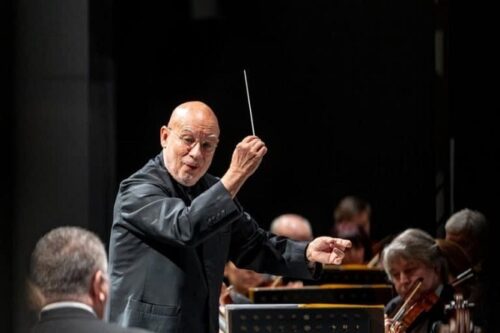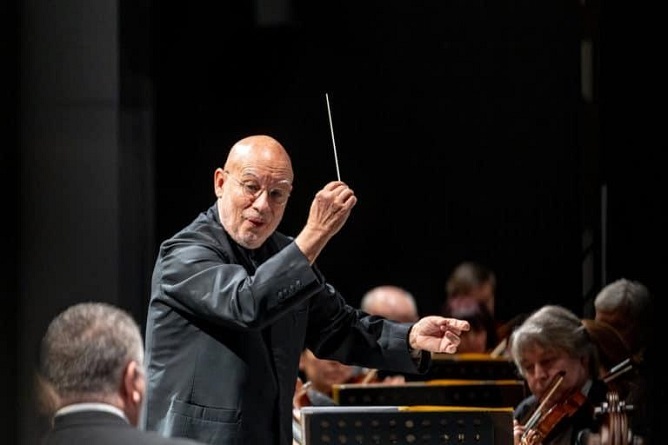 United Kingdom Janáček, Martinů, Dvořák: Laura van der Heijden (cello), Brno Philharmonic Orchestra / Dennis Russell-Davies (conductor). The Anvil, Basingstoke, 14.10.2022. (NB)
United Kingdom Janáček, Martinů, Dvořák: Laura van der Heijden (cello), Brno Philharmonic Orchestra / Dennis Russell-Davies (conductor). The Anvil, Basingstoke, 14.10.2022. (NB)

Janáček – Taras Bulba – Rhapsody for Orchestra; Jealousy
Martinů – Cello Concerto No.1, H.19
Dvořák – Symphony No.8 in G major, Op.88
Another valuable and interesting concert as part of Anvil Arts ‘International Concert Series’. Especially so since it was an opportunity to hear one of the best Czech orchestras playing music by their ‘hometown’ composer Leoš Janáček. Sad to relate then that the attendance in the hall was modest – barely half full but all the performances were warmly applauded by the attentive audience. From the orchestral list it is apparent that this is still an orchestra that draws its membership from players born and I imagine trained in the country. While some elements of a ‘bohemian’ sound remain, it was notable that the collective sound of the orchestra was less recognisably Czech than I had been expecting.
In part this may be down to their principal conductor, the vastly experienced and well-travelled Dennis Russell-Davies. The music began with Janáček’s three-movement rhapsody for orchestra Taras Bulba. Both Russell-Davies’s conducting and the playing of this work were good examples of the approach to the entire programme. His conducting style is a model of unfussy clarity. Woodwind solos especially were beautifully played but are individually pointed with the group not seeking a homogenous blend in the way that many British orchestras do. Likewise, the brass have an edge to their playing that helps the instruments cut through the often-thick textures of the orchestral writing. String playing is relatively lean with clear articulation and alert ensemble playing but without the sheer saturation of tone that some orchestras promote.
Russell-Davies’s interpretations of these dramatic/romantic scores is unsentimental and objective. In this Janáček rhapsody the benefit is a remarkable clarity of texture and an awareness of the complexity of the composer’s writing, but this does come at the expense of the sheer theatre of the work so that the ‘blazing optimism’ of the work’s closing pages (a quick mention for the excellence of Timothy Dowling’s programme notes) did not register with quite as great a sense of exultant release as I have heard elsewhere.
However, those exact same qualities contributed to making the Martinů Cello Concerto No.1 the highlight of the concert. Here the orchestra was joined by Laura van der Hiejden for a performance of bubbling brilliance. The programme points to Martinů’s prolific output but usually he did not revise existing works. This concerto was revised twice, and Van der Heijden played the (most common) second revision. Her playing was a genuine joy from first to last. Technically the considerable demands of the work caused her no problems but most notable was her easy identification with the spirit of the work – bustling energy interposed with passages of profound contemplation. Likewise, the objectivity of the score seemed to suit Russell-Davies’s style especially well and the orchestra responded with top-rank playing that was alert, energetic and sensitive. There is one extraordinary passage where the solo cello dialogues with the principal viola that was a delight. But the entire performance was a genuine triumph and very warmly applauded by the Basingstoke audience.
After the interval there was more Janáček, this time his symphonic poem/overture Jealousy. This is a concentrated, almost obsessive work written in parallel with his opera Jenůfa which occupies the same literal landscape and emotional terrain. Although not written as the overture to the opera it is often considered as a prelude – literal or otherwise to the work. In the concert hall it is a genuine rarity so a particular pleasure to hear this orchestra playing the work. Again Russell-Davies traded the sheer neo-Romantic drama of the work for clean textures and articulate rhythms. I have heard more blazingly thrilling versions which I probably prefer but the actual quality of the execution of the work was impressive.
The concert concluded with Dvořák’s Symphony No.8 in G major, Op.88. I suspect as a Czech orchestral player, this work – alongside a handful of other works by national composers – must be both a burden and a delight. As music in its own right, it is a minor miracle of beautiful melodic flow and orchestral invention, but it is something that such orchestras are obliged to perform endlessly on such international tours as presumably one of the works guaranteed to produce an audience. The playing here was everything one could hope for – technically accomplished and characterful – the principal flute got a well-deserved individual bow at the end. But I did have a sense that this is music that Russell-Davies does not particularly love. Certainly with his background as a contemporary music specialist, it should come as no surprise that he eschews any kind of sentimentality or indulgence. Dvořák as a composer has become a victim of a performance style that ‘milks’ opportunities for excessive expressive rubato and unmarked tempo variations within movements. By that measure Russell-Davies was a model of fine musical objectivity. The result was beautiful for sure but in a rather unsmiling way. String portamenti were nearly totally eliminated, phrase endings rarely expanded and overt emotion held in check. The benefits of this expressively lean approach was again clarity of texture and form with the genius of Dvořák’s handling of the musical material and his use of the orchestra laid bare in a literal sense. The closing pages of raptly poised string playing before the boisterous last bars of the work were very beautifully achieved – for some reason here Russell-Davies did allow a degree of expressive rubato – which to my ear benefitted the music and performance greatly. Again, this was very warmly received by the enthusiastic audience with conductor and orchestra receiving sustained applause.
A fine concert with Laura Van der Heijden’s cello playing the jewel at its centre.
Nick Barnard
